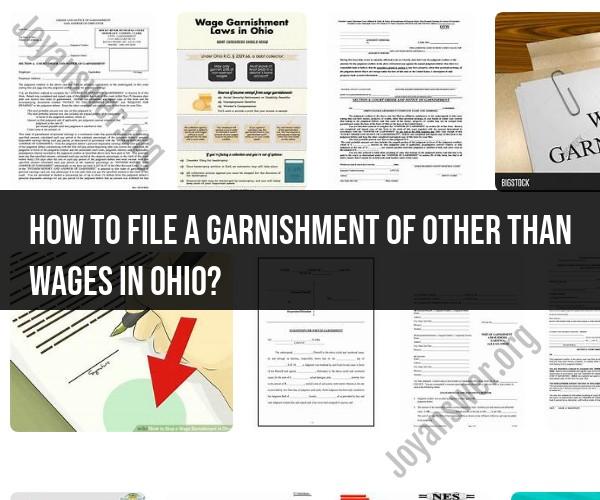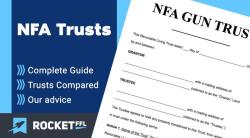How to file a garnishment of other than wages in Ohio?
In Ohio, the process for filing a garnishment for non-wage income, such as bank accounts or personal property, follows a specific legal procedure. Here are the general steps to file a garnishment of non-wage income in Ohio:
Determine the Debtor's Assets:
- Before filing for garnishment, you need to identify the debtor's assets that may be subject to garnishment. This could include bank accounts, personal property, or other assets of value.
Obtain a Judgment:
- You must have a legal judgment against the debtor before you can proceed with garnishment. This judgment can be obtained through a lawsuit and court proceedings.
Determine the Correct Court:
- Depending on the amount of the judgment and the type of assets you are seeking to garnish, you may need to file your garnishment action in different courts. Small claims cases are typically handled in municipal or county courts, while larger cases may go to a common pleas court.
Prepare Garnishment Documents:
- Obtain the necessary garnishment forms or documents specific to the court where you will be filing. The forms may vary depending on the court's requirements.
Complete Garnishment Forms:
- Fill out the garnishment forms accurately and completely. You will need information about the debtor, the judgment amount, and details about the assets you are seeking to garnish.
File Garnishment Forms:
- File the completed garnishment forms with the appropriate court. There may be filing fees associated with this process, so be prepared to pay those fees.
Serve Notice to the Debtor and Financial Institution:
- Once the court has accepted your garnishment filing, you will need to serve notice to both the debtor and the financial institution where the debtor's assets are held. This notice informs them of the pending garnishment.
Wait for a Response:
- After notice has been served, the financial institution has a specified period to respond to the garnishment. They may place a hold on the debtor's account while the garnishment is being processed.
Collect Garnished Funds:
- If the garnishment is successful, the financial institution will release the garnished funds to satisfy the judgment amount. This may take some time, and you may need to follow up with the court or financial institution.
Report to the Court:
- In some cases, you may need to report to the court regarding the amount collected through garnishment.
Comply with Legal Requirements:
- Ensure that you comply with all legal requirements and deadlines throughout the garnishment process. Failure to do so may affect the success of the garnishment action.
It's important to note that garnishment laws can be complex, and the specific process may vary depending on the circumstances of your case and the court where you file. It's advisable to consult with an attorney or legal expert who specializes in debt collection and garnishment in Ohio to ensure that you follow the correct legal procedures and have the best chance of success in your garnishment action.
To file a garnishment of non-wage assets in Ohio, you must follow these steps:
- Obtain a judgment against the debtor in a court of law.
- File a Motion for Order of Garnishment of Property Other Than Personal Earnings with the clerk of the court where the judgment was obtained.
- Serve the debtor with a copy of the Motion and a Notice of Hearing.
- Attend the hearing on the Motion and argue in favor of granting the garnishment order.
- If the court grants the garnishment order, serve the garnishee (the person or entity holding the debtor's assets) with a copy of the order.
- The garnishee must then withhold the debtor's assets and send them to the court clerk to be applied to the judgment.
How to Pursue Garnishment Beyond Wages in Ohio
To pursue garnishment beyond wages in Ohio, you must file a Motion for Order of Garnishment of Property Other Than Personal Earnings with the court. In the Motion, you must identify the specific non-wage assets that you want to garnish.
Some examples of non-wage assets that can be garnished in Ohio include:
- Bank accounts
- Investment accounts
- Real estate
- Vehicles
- Tax refunds
- Social Security benefits
Legal Procedures for Garnishing Non-Wage Assets in the State
Once you have filed the Motion, the court will schedule a hearing. At the hearing, you will have to prove to the court that the debtor has non-wage assets that can be garnished and that you are entitled to garnish those assets.
If the court grants the garnishment order, you will need to serve the garnishee with a copy of the order. The garnishee is then legally obligated to withhold the debtor's assets and send them to the court clerk to be applied to the judgment.
It is important to note that there are certain exemptions to garnishment in Ohio. For example, you cannot garnish a debtor's primary residence or their Social Security benefits if they are the debtor's only source of income.
If you have any questions about garnishing non-wage assets in Ohio, you should consult with an attorney.













